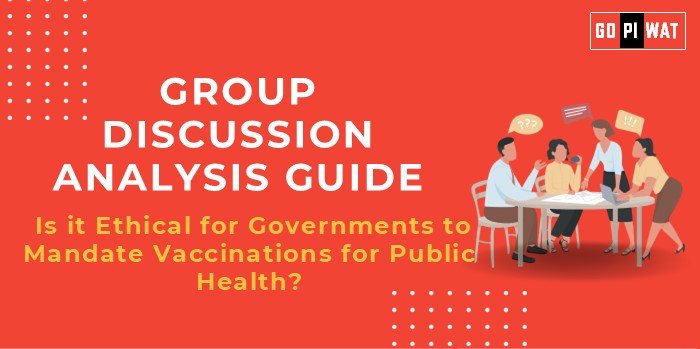📋 Group Discussion Analysis Guide: Is it Ethical for Governments to Mandate Vaccinations for Public Health?
🌐 Introduction to the Topic
Opening Context: “The COVID-19 pandemic reignited debates on individual rights versus collective welfare, making vaccination mandates a critical ethical and policy concern worldwide.”
Topic Background: Vaccination mandates are not new but have become contentious in balancing public health priorities with personal freedoms. Governments globally grapple with these ethical dilemmas, particularly amid crises like COVID-19 or measles outbreaks.
📊 Quick Facts and Key Statistics
- Vaccination Rate: Over 70% of the global population received at least one COVID-19 vaccine dose (WHO, 2023).
- Herd Immunity Threshold: For diseases like measles, 95% vaccination coverage is necessary to prevent outbreaks (CDC).
- Economic Impact: Vaccine-preventable diseases cost global economies over $50 billion annually in lost productivity (World Bank, 2023).
- Mandate Laws: Over 15 countries, including France and Italy, enforce mandatory vaccinations for school entry.
- Public Opinion: Surveys indicate 60% global support for mandates, though rates vary by region and demographics (Pew Research).
👥 Stakeholders and Their Roles
- Governments: Enforce policies, fund vaccine programs, and balance ethical considerations.
- Healthcare Providers: Educate the public and ensure safe vaccine administration.
- Citizens: Navigate personal choices versus societal responsibilities.
- International Agencies: WHO and UNICEF advocate for equitable vaccine distribution.
- Private Sector: Develop and distribute vaccines efficiently.
🏆 Achievements and Challenges
Achievements
- Disease Eradication: Smallpox eradication relied on global vaccination mandates.
- Economic Benefits: Vaccination programs yield a 16-fold return on investment through healthcare savings (Gavi, 2023).
- Public Safety: Mandates have significantly reduced preventable diseases like polio in India.
Challenges
- Ethical Dilemma: Balancing individual autonomy against public health needs.
- Misinformation: Vaccine hesitancy fueled by online misinformation.
- Access Inequities: Developing nations struggle with vaccine supply and distribution.
🌍 Global Comparisons
- Success: Australia’s “No Jab, No Pay” policy increased childhood vaccination rates by 5%.
- Challenges: Italy faced protests against its mandatory school vaccination law.
Case Studies
- India: Polio vaccination campaigns under Pulse Polio successfully eliminated the disease by 2014.
- USA: California’s 2015 school mandate increased measles vaccine compliance post-outbreak.
🗣️ Structured Arguments for Discussion
- Supporting Stance: “Mandates protect vulnerable populations by achieving herd immunity, reducing outbreaks.”
- Opposing Stance: “Compulsory vaccination infringes on personal freedoms and bodily autonomy.”
- Balanced Perspective: “While mandates safeguard public health, they must ensure transparency and equitable implementation.”
🚀 Effective Discussion Approaches
- Opening Approaches:
- Statistical Impact: “Vaccines save 4-5 million lives annually, yet coverage gaps remain critical (WHO, 2023).”
- Contrast: “While vaccine mandates eradicate diseases like polio, they also spark ethical debates.”
- Case Study: “India’s polio eradication success highlights the potential of mandates.”
- Counter-Argument Handling:
- Acknowledge concerns: “Mandates challenge autonomy but ensure greater societal welfare.”
- Present solutions: “Transparent communication and exemptions for medical reasons can address public hesitancy.”
📋 Strategic Analysis of Strengths and Weaknesses
- Strengths: Proven efficacy in disease prevention, cost-effective public health intervention.
- Weaknesses: Potential backlash due to perceived overreach, unequal access in low-income regions.
- Opportunities: Build trust through public awareness campaigns, innovate in vaccine delivery and storage.
- Threats: Misinformation undermining trust, legal challenges and protests.
📚 Connecting with B-School Applications
- Real-World Applications: Topics for policy design, healthcare management, and public trust in governance.
- Sample Questions:
- “How can ethical considerations shape vaccination policy?”
- “Discuss the role of technology in vaccine distribution.”
- Insights for Students: Explore the intersection of ethics and public health, assess public policy through frameworks like SWOT or PESTLE.


